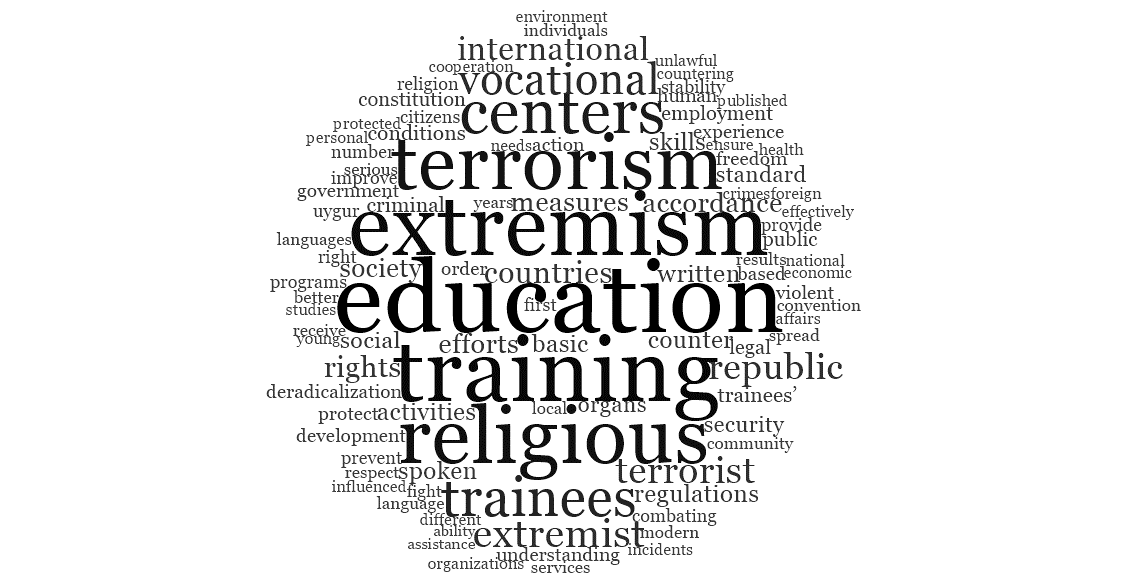Original document link: Click Here
Overview
This paper focuses mainly on the effectiveness of the “vocational education and training centers” in stemming the spread of religious extremism in Xinjiang. The first section highlights how separatists, religious extremists and terrorists carried out several thousand attacks. All of this has adversely affected the social and economic development in the region.
“Influenced and controlled by religious extremism, many people have engaged in – or have been instigated, coerced or enticed to engage in – terrorist and extremist activities, but they have not committed serious crimes or inflicted actual harm… Without necessary intervention measures, it will not be possible for them to cast off the shackles of religious extremism, get back to normal life, and improve their prospects for a better future”
The paper further states that the government is addressing the symptoms and the roots causes of terrorism “…by educating and rehabilitating people influenced by religious extremism and involved in minor violations of the law.”
The paper then goes on to establish the legality of this education and training by listing out the regulations and constitutional provisions that govern these “vocational education and training centers.”
The paper also gives an overview of sentencing and jurisdictional issues relating to criminal acts of terrorism and extremism. “Depending on the circumstances of the offence and the willingness of the parties to acknowledge their guilt, some cases can be handled by public security and other administrative organs… These different approaches and procedures reflect the principle of balancing compassion and severity in the national criminal law and the idea of reforming offenders through education and rehabilitation.”
The paper then lists out three categories of prisoners in the centres.
- “People who were incited, coerced or induced into participating in terrorist or extremist activities, or people who participated in terrorist or extremist activities in circumstances that were not serious enough to constitute a crime;
- People who were incited, coerced or induced into participating in terrorist or extremist activities, or people who participated in terrorist or extremist activities that posed a real danger but did not cause actual harm, whose subjective culpability was not deep, who acknowledged their offences and were contrite about their past actions and thus do not need to be sentenced to or can be exempted from punishment, and who have demonstrated the willingness to receive training;
- People who were convicted and received prison sentence for terrorist or extremist crimes and after serving their sentences, have been assessed as still posing a potential threat to society, and who have been ordered by people’s courts in accordance with the law to receive education at the centers.”
The procedure for carrying out “education and training” depends on the nature and circumstances of the acts in accordance with the laws and regulations, such as the Criminal Law, Criminal Procedure Law, and Counter-terrorism Law.
“The first category should first be handled by public security organs, and then given assistance and education by vocational education and training centers. The second category should first be investigated by public security organs, and if the procuratorial organs, after reviewing the cases, have made the decision not to institute legal proceedings, they should then be given assistance and education by education and training centers. The third category, after being assessed before their release from prison and found to pose an ongoing risk to society, shall be placed at such centers to receive education to help them reintegrate into society in accordance with the decision of people’s courts.”
The paper also stresses that these “education and training efforts” are in line with the basic principles clearly defined in the relevant international conventions and initiatives and that China upholds the UN Charter and other principles and norms of international law. It then proceeds to list out a list of conventions (all relating to terrorism) that China has signed onto.
The paper specifically highlights how poverty, unemployment, and the absence of alternative employment opportunities are considered background causes of violent extremism in the United Nations Plan of Action to Prevent Violent Extremism. It concludes by stressing that the vocational training efforts of Xinjiang manifest China’s implementation of international counter-terrorism and deradicalization initiatives and measures.
| 15 most common words: | |
|---|---|
| Word | Count |
| education | 93 |
| training | 82 |
| extremism | 79 |
| religious | 71 |
| terrorism | 69 |
| centers | 54 |
| trainees | 45 |
| vocational | 34 |
| extremist | 31 |
| terrorist | 28 |
| republic | 27 |
| international | 23 |
| countries | 21 |
Word cloud:
(Minimum 5 letters)
